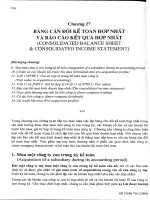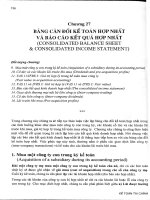Gíao trình kế toán bằng tiếng anh ch02
Bạn đang xem bản rút gọn của tài liệu. Xem và tải ngay bản đầy đủ của tài liệu tại đây (152.96 KB, 4 trang )
CHAPTER 2—PROBLEMS: SET B
P2-1B Pedriani Company uses a job order cost system and applies overhead to production on the basis of direct labor hours. On January 1, 2014, Job No. 25 was the only job
in process. The costs incurred prior to January 1 on this job were as follows: direct materials $10,000; direct labor $6,000; and manufacturing overhead $9,000. Job No. 23 had
been completed at a cost of $42,000 and was part of finished goods inventory. There was a
$5,000 balance in the Raw Materials Inventory account.
During the month of January, the company began production on Jobs 26 and 27, and
completed Jobs 25 and 26. Jobs 23 and 25 were sold on account during the month for
$63,000 and $74,000, respectively. The following additional events occurred during the
month.
Prepare entries in a job order
cost system and job cost
sheets.
(LO 2, 3, 4, 5, 6), AP
1. Purchased additional raw materials of $45,000 on account.
2. Incurred factory labor costs of $33,500. Of this amount, $7,500 related to employer
payroll taxes.
3. Incurred manufacturing overhead costs as follows: indirect materials $10,000; indirect
labor $9,500; depreciation expense on equipment $12,000; and various other manufacturing overhead costs on account $11,000.
4. Assigned direct materials and direct labor to jobs as follows.
Job No.
Direct Materials
Direct Labor
25
26
27
$ 5,000
17,000
13,000
$ 3,000
12,000
9,000
5. The company uses direct labor hours as the activity base to assign overhead. Direct
labor hours incurred on each job were as follows: Job No. 25, 200; Job No. 26, 800; and
Job No. 27, 600.
Instructions
(a) Calculate the predetermined overhead rate for the year 2014, assuming Pedriani Company estimates total manufacturing overhead costs of $440,000, direct labor costs of
$300,000, and direct labor hours of 20,000 for the year.
(b) Open job cost sheets for Jobs 25, 26, and 27. Enter the January 1 balances on the job
cost sheet for Job No. 25.
(c) Prepare the journal entries to record the purchase of raw materials, the factory labor
costs incurred, and the manufacturing overhead costs incurred during the month of
January.
(d) Prepare the journal entries to record the assignment of direct materials, direct labor,
and manufacturing overhead costs to production. In assigning manufacturing overhead costs, use the overhead rate calculated in (a). Post all costs to the job cost sheets
as necessary.
(e) Total the job cost sheets for any job(s) completed during the month. Prepare the journal entry (or entries) to record the completion of any job(s) during the month.
(f) Prepare the journal entry (or entries) to record the sale of any job(s) during the month.
(g) What is the balance in the Work in Process Inventory account at the end of the month?
What does this balance consist of?
(h) What is the amount of over- or underapplied overhead?
P2-2B For the year ended December 31, 2014, the job cost sheets of Dosey Company contained the following data.
Job
Number
Explanation
Direct
Materials
Direct
Labor
Manufacturing
Overhead
Total
Costs
7650
Balance 1/1
Current year’s costs
$18,000
32,000
$20,000
36,000
$25,000
45,000
$ 63,000
113,000
7651
Balance 1/1
Current year’s costs
12,000
30,000
16,000
40,000
20,000
50,000
48,000
120,000
7652
Current year’s costs
35,000
68,000
85,000
188,000
(e) Job 25, $37,400
Job 26, $46,600
Prepare entries in a job order
cost system and partial income
statement.
(LO 2, 3, 4, 5, 6), AN
P-1
P-2
Problems: Set B
Other data:
1. Raw materials inventory totaled $20,000 on January 1. During the year, $100,000 of raw
materials were purchased on account.
2. Finished goods on January 1 consisted of Job No. 7648 for $93,000 and Job No. 7649
for $62,000.
3. Job No. 7650 and Job No. 7651 were completed during the year.
4. Job Nos. 7648, 7649, and 7650 were sold on account for $490,000.
5. Manufacturing overhead incurred on account totaled $135,000.
6. Other manufacturing overhead consisted of indirect materials $12,000, indirect labor
$16,000, and depreciation on factory machinery $19,500.
(a) (1) $111,000
(4) $180,000
Unfinished job 7652,
$188,000
(b) Amount 5 $2,500
(c) $156,500
Prepare entries in a job order
cost system and cost of goods
manufactured schedule.
Instructions
(a) Prove the agreement of Work in Process Inventory with job cost sheets pertaining to
unfinished work. (Hint: Use a single T-account for Work in Process Inventory.) Calculate each of the following, then post each to the T-account: (1) beginning balance,
(2) direct materials, (3) direct labor, (4) manufacturing overhead, and (5) completed jobs.
(b) Prepare the adjusting entry for manufacturing overhead, assuming the balance is
allocated entirely to cost of goods sold.
(c) Determine the gross profit to be reported for 2014.
P2-3B Robert Perez is a contractor specializing in custom-built jacuzzis. On May 1, 2014,
his ledger contains the following data.
Raw Materials Inventory
Work in Process Inventory
Manufacturing Overhead
(LO 2, 3, 4, 5), AP
$30,000
12,200
2,500 (dr.)
The Manufacturing Overhead account has debit totals of $12,500 and credit totals of
$10,000. Subsidiary data for Work in Process Inventory on May 1 include:
Job Cost Sheets
Job
by Customer
Direct Materials
Direct Labor
Manufacturing
Overhead
$2,500
2,000
900
$2,000
1,200
800
$1,400
840
560
$5,400
$4,000
$2,800
Stiner
Alton
Herman
During May, the following costs were incurred: raw materials purchased on account
$4,000, labor paid $7,000, and manufacturing overhead paid $1,400.
A summary of materials requisition slips and time tickets for the month of May reveals
the following.
Job by Customer
Stiner
Alton
Herman
Smith
General use
Materials Requisition Slips
Time Tickets
$ 500
600
2,300
1,900
$ 400
1,000
1,300
2,300
5,300
1,500
5,000
2,000
$6,800
$7,000
Overhead was charged to jobs on the basis of $0.70 per dollar of direct labor cost. The
jacuzzis for customers Stiner, Alton, and Herman were completed during May. The three
jacuzzis were sold for a total of $36,000.
Instructions
(a) Prepare journal entries for the May transactions: (i) for purchase of raw materials, factory labor costs incurred, and manufacturing overhead costs incurred; (ii) assignment
of raw materials, labor, and overhead to production; and (iii) completion of jobs and
sale of goods.
(b) Post the entries to Work in Process Inventory.
Problems: Set B
P-3
(c) Reconcile the balance in Work in Process Inventory with the costs of unfinished jobs.
(d) Prepare a cost of goods manufactured schedule for May.
(d) Cost of goods
manufactured $20,190
P2-4B Net Play Company uses a job order cost system in each of its three manufacturing
departments. Manufacturing overhead is applied to jobs on the basis of direct labor cost in
Department A, direct labor hours in Department B, and machine hours in Department C.
In establishing the predetermined overhead rates for 2014, the following estimates
were made for the year.
Compute predetermined
overhead rates, apply
overhead, and calculate
under- or overapplied
overhead.
(LO 4, 6), AP
Department
Manufacturing overhead
Direct labor cost
Direct labor hours
Machine hours
A
B
C
$720,000
$600,000
50,000
100,000
$640,000
$100,000
40,000
120,000
$900,000
$600,000
40,000
150,000
During January, the job cost sheets showed the following costs and production data.
Department
Direct materials used
Direct labor cost
Manufacturing overhead incurred
Direct labor hours
Machine hours
A
B
C
$92,000
$48,000
$60,000
4,000
8,000
$86,000
$35,000
$60,000
3,500
10,500
$64,000
$50,400
$72,100
4,200
12,600
Instructions
(a) Compute the predetermined overhead rate for each department.
(b) Compute the total manufacturing costs assigned to jobs in January in each department.
(c) Compute the under- or overapplied overhead for each department at January 31.
(a) 120%, $16, $6
(b) $197,600, $177,000,
$190,000
(c) $2,400 $4,000, $(3,500)
P2-5B Bell Company’s fiscal year ends on June 30. The following accounts are found in its
job order cost accounting system for the first month of the new fiscal year.
Analyze manufacturing
accounts and determine
missing amounts.
Raw Materials Inventory
July 1
31
Beginning balance
Purchases
July 31
Ending balance
19,000
90,400
July 31
Requisitions
(LO 2, 3, 4, 5, 6), AN
(a)
(b)
Work in Process Inventory
July 1
31
31
31
Beginning balance
Direct materials
Direct labor
Overhead
July 31
Ending balance
(c)
80,000
(d)
(e)
July 31
Jobs completed
(f)
(g)
Finished Goods Inventory
July 1
31
Beginning balance
Completed jobs
(h)
(i)
July 31
Ending balance
(k)
July 31
Factory wages
(l)
July 31
31
31
Indirect materials
Indirect labor
Other overhead
July 31
Cost of goods sold
(j)
Factory Labor
July 31
Wages assigned
(m)
Manufacturing Overhead
8,900
16,000
(n)
July 31
Overhead applied
117,000
P-4
Problems: Set B
Other data:
1. On July 1, two jobs were in process: Job No. 4085 and Job No. 4086, with costs of
$19,000 and $8,200, respectively.
2. During July, Job Nos. 4087, 4088, and 4089 were started. On July 31, only Job No.
4089 was unfinished. This job had charges for direct materials $2,000 and direct labor
$1,500, plus manufacturing overhead. Manufacturing overhead was applied at the rate
of 130% of direct labor cost.
3. On July 1, Job No. 4084, costing $145,000, was in the finished goods warehouse. On
July 31, Job No. 4088, costing $138,000, was in finished goods.
4. Overhead was $3,000 underapplied in July.
(d) $ 90,000
(f) $308,750
(l) $106,000
Instructions
List the letters (a) through (n) and indicate the amount pertaining to each letter. Show
computations.









